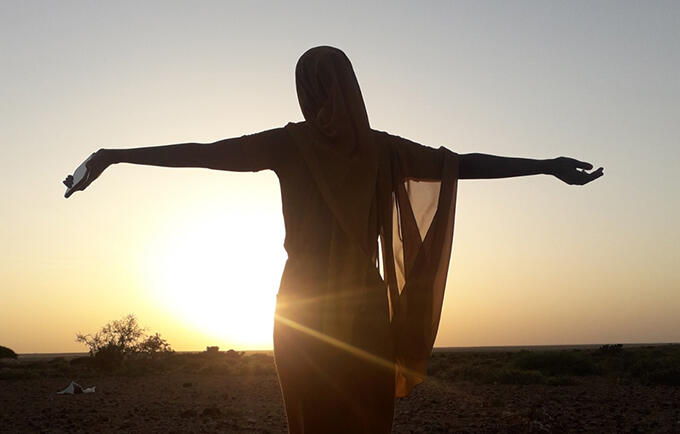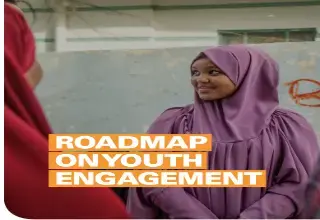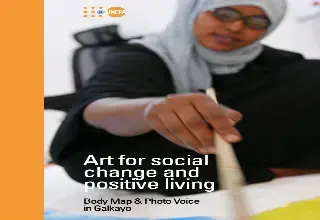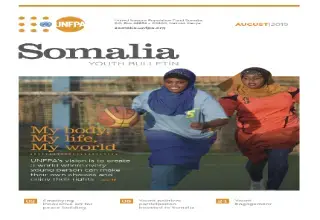“Many Somali young girls are faced with a lot of challenges; early marriage, female genital mutilation, lack of education and many others. But you know? This does not stop them from pursuing their goals and dreams,” says ZamZam Abdigafar.
ZamZam is a 23-year old girl who lives in Garowe. She graduated from university and is now working with civil society organizations advocating for child protection.
She recently attended the body mapping workshop organized and funded by UNFPA Somalia. ZamZam says the workshop helped her discover that she can paint from the heart; she can paint her most hidden thoughts and the memories she cannot speak of. “As there is no mental and emotional support present for me, I now utilize painting as a form of self-therapy. I can express my happiness, sadness, trials and feelings of exclusion through art. It acts as a safe space for sharing my feelings,” she says.
“Body mapping is a creative tool that brings together bodily experience and visual artistic expression,” explains UNFPA Somalia Programme Officer for Youth and innovation Fatuma Kuno Muhumed, adding: “in its basic form, it involves painting a life-size representation of one’s body onto a large surface and use vibrant colours, pictures, symbols and words to represent experiences. These works are made by non-professional artists and provide a time for creativity, critical thinking, stock taking and ultimately engage people to better understand and respect one another.
Muhumed says body mapping provides a creative vehicle for expression that is not dependant on literacy levels. “The body maps have the potential to break down barriers, both in the process of their development and in sharing them with a wider audience since the individuals depicted in the maps are never reduced to stereotypes but rather express personally lived experience,” she explains.
“This training was very important. The truth is that in the beginning, I thought I could not paint anything. Our society does not encourage visual art,” ZamZam says.
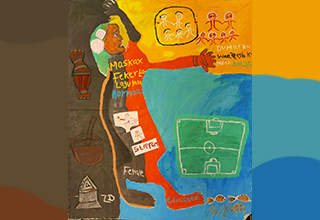
The norms in Somalia make it routine for girls to start housework from the tender age of four or five years old. ZamZam recalls having to do housework constantly as she ponders on a woman’s place in Somalia.
“You do most of your housework without any motivation or help even if you still go to school. There are no weekends because you also have to work on Fridays. These factors make you very stressed. Many girls are spoken to as though they have low thinking capability, and if you want to do something for your development, you are told that it not acceptable just sit down,” says ZamZam.
She says that it is common in her society that girls are discouraged from complaining. “When you have brothers, you cannot share your problems with them. It is even more difficult with your father. If you seek advice, you are told to ask your mother. Many girls need to be motivated. Using art for social change is healing,” says ZamZam.
She also says the painting she produced during the workshop reminds her of her childhood memories and the challenges she experienced after undergoing FGM.
“It took me an hour to think about how to express those bad memories. Finally, I managed to be confident and painted. This is the first time I have openly talked about FGM to men,” she explains.
She says FGM is a big challenge and must be eradicated because it leaves girls with stigma and complications. “It just fosters fear and tears.”
The young woman is also against child marriage. She advises parents to stop early child marriage because the young girls’ bodies are still undergoing changes and their minds are still immature. “Most young girls cannot take care of themselves, let alone a marriage,” exclaims ZamZam.
She explains that the girls end up dropping out of school and do not understand their husbands. “They face situations they cannot handle, and it makes them despise life and seek another life through illegal migration, or they end up committing suicide. Some husbands do not care and call the parents to take the body of the deceased and continue living their lives as nothing has happened,” worries ZamZam.
“A lot of Somali women need counselling,” she declares.
The youth advocate says that people did not always appreciate her outspoken stand as she was growing up. “At school, I was told by others to close my mouth. Some even asked if I was a foreigner; are you from Somalia? Are you from the clan with great authority, or is your father a military general?”
ZamZam also shared some happy memories through her art. “I remember during my childhood, I used to advise on some issues, and my grandfather used to say that my advice should be listened to. I felt like a princess. I was lucky, I grew up in an environment with love, and I was given everything I needed.”
She emphasizes that she has learnt a lot from the body mapping project, including boosting her confidence levels. “I also feel more relaxed as I am now able to express myself more and realizing the importance of sharing views and experiences.”
“I can now use painting, drawing and photography to express social issues and contribute to peacebuilding and advocate more against discrimination of women and towards ending FGM and child marriage,” adds ZamZam.
She further describes body mapping as freedom of expression. “The workshop has helped me understand that paintings and photos carry a lot of meaning. As an agent of change, you can use these to raise awareness on social issues and showcase society’s beauty and hope. Paintings also help in preserving the culture and history of the country.”
The young woman says she is proud to be among the first in Garowe to undertake the workshop in Garowe. “We need more workshop projects to change wrong perceptions within our society. We are from diverse backgrounds and have different experiences within. Body mapping provides social cohesion.”
“I have decided that I will buy different painting colours and during my free time, I will start painting to express my thoughts. I also feel strong enough to speak for those people who cannot speak for themselves. Where there is art, there is life,” ZamZam concludes.
Promoting youth leadership and participation is key to UNFPA’s work. The efforts enable young people to develop the skills, knowledge and support needed to make informed decisions about their bodies, lives, families, communities, countries and the world. UNFPA engages young people in its work and advocates for youth engagement in the work of others.
Just as importantly, UNFPA provides financial and technical support to adolescents and youth who are in the process of building networks and organizations to advocate for their human rights. The inclusion of youth from diverse backgrounds and identities, particularly the disadvantaged and marginalized, is prioritized. UNFPA also promotes the meaningful participation of young people in international settings where issues relating to them will be discussed. Many of the youth networks UNFPA supports have been effective advocates for youth issues in international and regional forums.

